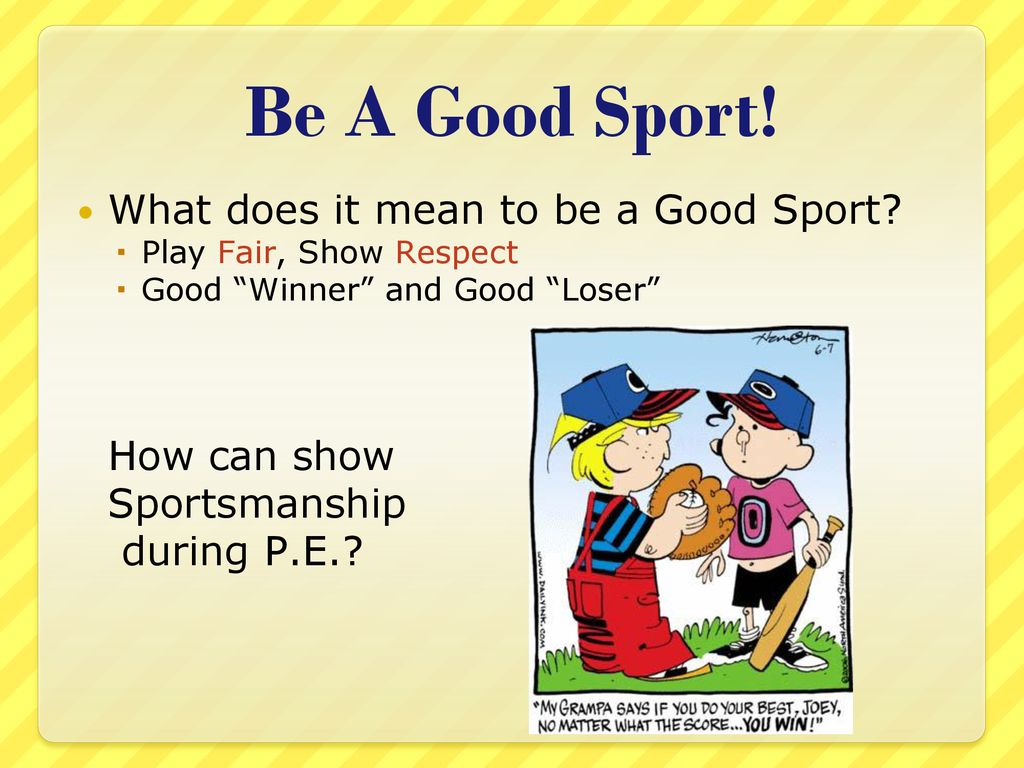Being a good sport means more than just playing well. It involves attitude and behavior.
In the world of sports, the term “good sport” holds significant value. It’s not just about winning or losing, but how one conducts themselves in the game. A good sport is someone who shows respect, fairness, and graciousness, no matter the outcome.
This quality is admired and appreciated by teammates, opponents, and spectators alike. It reflects a deeper understanding of the spirit of the game and contributes to a positive and enjoyable environment for everyone involved. Understanding the true meaning of being a good sport can enhance your experience in any competitive or recreational activity. So, what does it truly take to be a good sport? Let’s explore.

Credit: www.pinterest.com
Introduction To Good Sport
Being a good sport is about more than just playing the game. It involves showing respect, staying positive, and encouraging fair play. This concept is crucial in all aspects of life, not just sports. In this blog post, we will explore what it means to be a good sport and why it matters.
Concept Of Fair Play
Fair play is the foundation of being a good sport. It means playing by the rules and respecting the game. This concept teaches us the importance of honesty and integrity. When you practice fair play, you ensure the game is enjoyable for everyone involved.
| Aspect | Explanation |
|---|---|
| Following Rules | Adhering to the established guidelines of the game. |
| Respecting Opponents | Showing courtesy to other players, win or lose. |
| Accepting Decisions | Respecting the calls made by referees or officials. |
Importance Of Positivity
Positivity is a key trait of a good sport. Staying positive helps keep morale high and fosters a healthy environment. Even in challenging situations, a positive attitude can make a big difference.
- Encourages teamwork and collaboration.
- Boosts confidence and motivation.
- Reduces stress and anxiety.
Remember, being a good sport is not just about winning. It’s about how you play the game and treat others. Stay positive, play fair, and always strive to be the best version of yourself.
Historical Context
The concept of being a “good sport” has deep historical roots. Understanding its origins and evolution helps appreciate the importance of sportsmanship today.
Origins Of Sportsmanship
Sportsmanship began in ancient civilizations. Early records show that Greeks and Romans valued fair play. They believed in competing with honor. This was crucial in the Olympic Games.
In medieval times, chivalry influenced sportsmanship. Knights followed codes of conduct. They showed respect to their opponents. This shaped the idea of fair play in competitions.
Evolution Over Time
Sportsmanship evolved during the Renaissance. Games became more organized. Rules were set to ensure fairness. Respect for opponents became even more important.
In the 19th century, modern sports emerged. The British played a significant role. They introduced sports like football and cricket. These sports had strict rules promoting fair play. This era cemented sportsmanship in global sports culture.
Today, sportsmanship is a universal concept. It transcends cultures and sports. Respect, fairness, and integrity define a good sport. These values are taught from a young age. They are integral to the spirit of competition.
| Period | Key Developments in Sportsmanship |
|---|---|
| Ancient Times | Fair play in Greek and Roman games |
| Medieval Times | Chivalry influencing respectful competition |
| Renaissance | Organized games with fairness rules |
| 19th Century | Modern sports with strict fair play rules |
| Today | Universal values of respect, fairness, and integrity |
Core Principles
The essence of being a good sport goes beyond just playing the game. It encompasses a range of values and behaviors that demonstrate respect, fairness, and integrity. Understanding these core principles can help athletes, coaches, and fans alike foster a positive sporting environment.
Integrity In Competition
Integrity in competition means playing the game honestly. It involves adhering to the rules and not seeking unfair advantages. Players with integrity do not cheat or bend the rules. They play to the best of their ability while maintaining fair play.
Here are some key points to consider for integrity in competition:
- Honesty: Always tell the truth, even when it’s hard.
- Fair Play: Follow the rules and respect the officials’ decisions.
- Accountability: Take responsibility for your actions on and off the field.
Respect For Opponents
Respect for opponents is crucial in any sport. It means recognizing their skills and efforts. Treating them with courtesy, both in victory and defeat, shows true sportsmanship.
Consider these aspects to show respect for opponents:
- Acknowledgment: Congratulate your opponents for their performance.
- Courtesy: Avoid trash-talking and negative comments.
- Empathy: Understand that your opponent is also striving to do their best.
Instilling these core principles in sports can lead to a more enriching and respectful sporting experience for everyone involved.

Credit: slideplayer.com
Benefits Of Being A Good Sport
Being a good sport has many advantages. It goes beyond winning or losing. It impacts your personal life and relationships. You learn valuable skills that help in various areas of life.
Personal Growth
Good sportsmanship teaches patience and resilience. You face challenges and learn to overcome them. This helps build character. You also develop a strong sense of self-control. Handling wins and losses gracefully strengthens your mental toughness.
Respect is another key benefit. You learn to respect opponents, teammates, and referees. This respect extends to other areas of life. It fosters a positive attitude and a sense of fairness. These qualities are essential for personal development.
Enhanced Team Dynamics
Being a good sport improves teamwork. It fosters trust among team members. This trust is crucial for achieving common goals. Cooperation and communication within the team get better. Everyone feels valued and included.
Good sportsmanship also reduces conflicts. Teams with good sportsmanship handle disputes calmly. This leads to a more harmonious environment. It allows the team to focus on performance and success. Strong team dynamics result in better outcomes for everyone.
Examples Of Good Sportsmanship
Good sportsmanship stands out on and off the field. It shows respect, integrity, and kindness. Let’s explore some examples that highlight these values.
Iconic Moments
Some moments in sports history highlight true sportsmanship. For example, in the 1936 Olympics, Jesse Owens, an African American athlete, was supported by his German rival, Luz Long. Despite the tense political climate, Long gave Owens advice that helped him win gold. Their friendship showed the world the importance of respect.
Another iconic moment happened in 2008. During a softball game, Sara Tucholsky injured herself after hitting a home run. Her opponents, Mallory Holtman and Liz Wallace, carried her around the bases. This act of kindness remains a powerful example of good sportsmanship.
Everyday Acts
Good sportsmanship is not only seen in big events. It happens in everyday games. A soccer player helping an opponent up after a fall shows respect. Shaking hands with the other team, win or lose, is a simple yet important gesture.
Parents and coaches play a key role too. They teach kids to play fair and respect others. Cheering for all players, not just their own, promotes a positive atmosphere. These everyday acts build a strong foundation for good sportsmanship.

Credit: x.com
Challenges To Fair Play
Fair play is the essence of sports. It fosters respect and integrity among players. Yet, several challenges threaten fair play. These challenges can undermine the true spirit of the game. They can turn a fun activity into a stressful competition.
Pressure To Win
The pressure to win is immense in sports. This pressure can come from coaches, parents, and peers. It can lead athletes to make poor decisions. They might prioritize winning over playing fair. This pressure can also cause stress and anxiety. Athletes may fear failure. This fear can push them to cheat or break rules.
Unsporting Behavior
Unsporting behavior is another challenge to fair play. It includes actions that are against the spirit of the game. Examples include taunting, faking injuries, and wasting time. These actions show a lack of respect for opponents. They can ruin the experience for everyone. Unsporting behavior can also lead to penalties or disqualifications. It sets a bad example for younger players.
Promoting Good Sport Values
Promoting good sport values is crucial for developing well-rounded athletes. Good sportsmanship involves showing respect, fairness, and compassion, both on and off the field. These values help create a positive sports environment, encouraging healthy competition and mutual respect. Let’s explore how coaches and parents play essential roles in fostering these values.
Role Of Coaches
Coaches have a significant influence on their athletes. They are role models who teach more than just skills. They instill values like teamwork, discipline, and respect. A coach who promotes good sport values creates a positive atmosphere. This helps athletes understand the importance of fair play and respect for opponents.
Here are some ways coaches can promote good sport values:
- Emphasize the importance of following rules and respecting officials.
- Encourage teamwork and recognize the contributions of all team members.
- Lead by example, showing respect in all interactions.
Influence Of Parents
Parents also play a vital role in promoting good sport values. They are often a child’s first role models. A parent who shows respect and fairness helps their child understand these values. This support can make a significant difference in an athlete’s development.
Here are some ways parents can promote good sport values:
- Support their children, win or lose, and emphasize the importance of effort.
- Encourage respect for coaches, teammates, and opponents.
- Model positive behavior by showing respect for all participants.
Frequently Asked Questions
What Does “good Sport” Mean?
A “good sport” refers to someone who behaves kindly and fairly in competitions. They accept wins and losses graciously. This term is often used to describe individuals who show respect to others, regardless of the outcome of the game.
How To Be A Good Sport?
To be a good sport, show respect to teammates and opponents. Accept wins and losses graciously. Encourage others and maintain a positive attitude. Always follow the rules and play fair.
Why Is Being A Good Sport Important?
Being a good sport promotes teamwork and respect. It helps build strong relationships and creates a positive environment. Good sportsmanship encourages fair play and reduces conflicts in competitions.
Can Children Learn To Be Good Sports?
Yes, children can learn to be good sports through guidance and practice. Parents and coaches should model good sportsmanship. Encouraging positive behavior and teaching the value of respect and fair play is essential.
Conclusion
Being a good sport means showing respect and kindness in sports. It includes accepting both wins and losses with grace. True sportsmanship builds friendships and promotes fair play. Encourage others by being a role model. Remember, it’s not just about winning.
It’s about enjoying the game and playing fairly. Show your best self, always.



